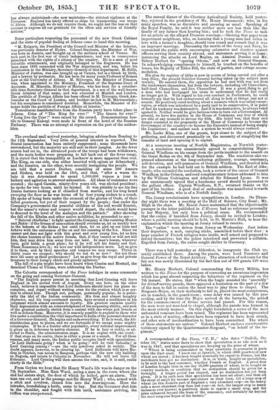' The annual dinner of the Chertsey Agricultural Society, held
yester- day, rejoiced in the prefidency of Mr. Henry Drummond ; who, in his many speeches, was as discursive and amusing as usual. Speaking of the Royal Family, he said it was neither more nor less than like the family of any farmer then hearing him; and he took the Times to task for an article on the alleged Prussian marriage,—likening that paper to an impertinent neighbour, who, on learning that a young man had fallen in love with a farmer's daughter, should turn round and remark that it was an improper marriage. Discussing the merits of the Army and Navy, he reproached the public with encouraging calumnies and slanders against officers serving their country abroad, and statesmen serving it at home ; instancing the attacks on Lord Raglan, on Admiral Dundee and Mr. Sidney Herbert for "sparing Odessa," and now on General Simpson. In acknowledging compliments to himself, he touched on the benefits of leases, his Registry of Titles Bill, the state of parties, and cottage accom- modation.
His plan for registry of titles is now in course of being carried out after a long delay, the present Solicitor-General having taken up the subject most warmly. He assured them, the opposition he had met with was not from the landowners themselves, but from the lawyers, including old Chancellors. half-dead Chancellors, and live Chancellors. It was a great thing to get a man who had mortgaged his estate to understand that he had really no longer got it. With regard to his own conduct in Parliament, he could honestly say that he had endeavoured all along to look at things and not at sounds. He positively cared nothing about a measure which was called conser- vative, or which was introduced by a party said to be conservative, if in point of fact its tendeney was destructive. And if it was destructive, he always voted against it. Neither would he give factious votes to turn out a Government. At present, we have five parties in the House of Commons, any four of which are able at any moment to devour the fifth. His belief was, that their real danger consisted in the propensity of the House of Commons to become the Government of the country—to become the Executive instead of being simply the Legislature; and against such a system he would always contend.
Mr. Locke King, one of the guests, kept closer to the subject of the gathering, and discoursed practically on the necessity of simplifying the transfer of land and opening it to capital.
At a numerous meeting of Norfolk Magistrates, at Norwich yester- day, a resolution was unanimously agreed to congratulating Major- General Windham on his escape from the perils incident to the assault on the Great Redan on the 8th of September last. The resolution also ex- pressed admiration at the long-enduring gallantry, courage, constancy, self-devotion, and self-possession of General Windham, and thanked him for the example he had held out to British soldiers. The Earl of Albe- marle, who seconded the resolution, took a review of the career of General Windham in the Crimea, and read complimentary lettere addressed to him by Sir William Codrington and Admiral Sir Edmund Lyons. It was also unanimously agreed that a handsome sword should be presented to the gallant officer. Captain Windham, R.N., returned thanks on the part of his brother. A good deal of enthusiasm was manifested towards General Windham, who is of a Norfolk family.
The Jersey revolutionists have sympathizers in London. On Thurs- day night there was a meeting at the Hall of Science, City Road ; Mr. Bligh in the chair. Mr. Ernest Jones maintained that the objectionable passages in the letter published in L'Homme had no reference personally to her Majesty, but only bore a political sense. He reoommended that the exiles if banished from Jersey, should be invited to London; where a public meeting should be held, in St. Martin's Hall, to hear the explanation which the meeting at Jersey refused to receive.
The "exiles " were driven from Jersey on Wednesday. Just before their departure, a mob, carrying sticks, assembled before their door : a large number of French refugees were inside, well armed and prepared to defend themselves ; but the police interfered and prevented a collision. Expelled from Jersey, the exiles sought shelter in Guernsey.


































 Previous page
Previous page